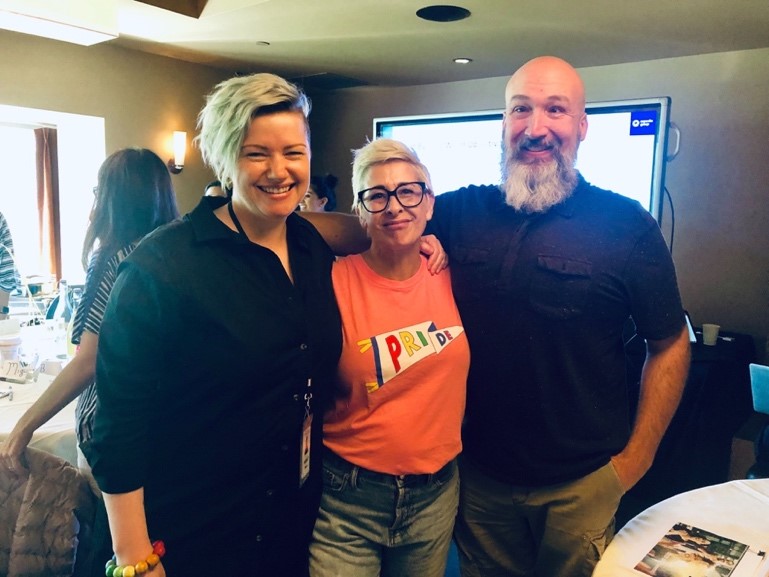Search Contract Jobs*
Hello!
You’re now leaving the Expedia Group careers site and will be directed to our supplier partner’s website to explore and apply for contract job opportunities with Expedia Group. The website is operated by Expedia Group’s employment partner.
*currently only offered in USA & UK
Jobs
Search Expedia Group Jobs
In order to ensure the future is accessible, we have to bring our whole selves to work, share our experiences with others, and influence the products and services we deliver to better include people of all abilities.

I have an announcement to make. I have bipolar. And Attention Deficit Disorder (ADD), Obsessive Compulsive Disorder (OCD), Post-Traumatic Stress Disorder (PTSD) and Excoriation Disorder (that’s skin picking). Sometimes I need accommodation for the more troublesome symptoms of my conditions so that my work isn’t negatively impacted. Writing this down and publishing it on the web is disclosure.
Disclosure is hard, especially when you have an invisible condition, like mental illness. Deciding if, when and how to share information about your situation can be overwhelming, especially at work. There’s no single right or wrong way to disclose a disability. We each must decide for ourselves.
On December 3, 2019, Expedia Group’s Ability Inclusion Movement (AIM) business resource group honored International Day of Persons with Disabilities. The theme this year was “The Future is Accessible.” In honor of this global celebration, we want to share a few disclosure stories that demonstrate how Expedia Group employees are handling it. I’ll start with mine.
“Mental illness is nothing to be ashamed of, but stigma and bias shame us all.”
Bill Clinton, President of the United States

Marnie Weber, Storytelling + Culture, AIM Vice President
I don’t know if I’m missing some gene that makes me keep things to myself, but I disclose to (almost) everyone. I’m not ashamed of my illnesses, rather I feel special for having them. When I’m manic, I’m super creative and innovative – you’ll often hear me say, “I have a million ideas!” When I’m depressed, I’m more empathetic and merciful. The problem is in the extremes. Like when I’m sure I can find a way to pay for that $300 sweater even though my budget doesn’t support it. Or when I’m out of control angry and fighting like an aggressive attorney with my (ex-)husband.
Since being diagnosed, and working with my psychiatrist to hone my treatment, I’m much more balanced – and much more able to speak up. Since then, I talk about my experiences of mental illness whenever I can. The stories we tell help others feel less alone, less weird – and help people unaffected by mental illness learn and, thus, change.
In truth, all humans hunger to be understood. Even more than desiring love. It’s important for people to feel that another can relate to their thoughts and feelings. When we don’t feel understood, we experience a break in the relationship and feel uneasy, alone or irritated. If we must keep a foundational part of ourselves, our mental health, secret, we might always feel this way. It’s no way to live.
Undiagnosed and untreated mental illness creates a ceiling in our lives. It’s a different, lower ceiling than the one we normally hear about. It’s invisible, too, and affects every aspect of our lives. The ceiling might be an inability to get ahead financially (that sweater!) or difficulty maintaining relationships (that attorney!) When we disclose, we begin to recognize the ceiling – and we can start the process of breaking through.
“Never give up on someone with mental illness. When “I” is replaced with “We,” illness becomes wellness.”
Shannon L. Alder, Author
Jeremy Fries, Scrum Master
To be honest, disclosing my condition was scary, because I didn’t know how people would react. Would people think that I was less qualified than others to do my job? Would they think that collaborating with me would be risky? Would they simply stop talking to me?
I was in a meeting with my immediate manager and two Directors, and I began to explain how I was investing my time and how I felt that each activity benefited Expedia Group. They were a little surprised that I included the time I spent participating in AIM events, so I went on to explain that I was diagnosed with Type 2 Bipolar Disorder, so I know a little of what it’s like to feel different. I told them that I believe my participation in AIM would help increase support for diversity and inclusion, and I hoped that it would encourage others to feel comfortable bringing their whole selves to work. Both things would make Expedia stronger and more competitive.
The Directors accepted my explanation and approved of my work. Afterward, my immediate manager told me that he was surprised that I disclosed the information, but he congratulated me for it. He encouraged me to continue my efforts to banish stigma in the workplace and told me that I could count on his ongoing support.
I was pleased with this result, and I’m grateful to work for such a forward-thinking company and with such amazing colleagues. However, upon reflection, I feel that this experience could have been even more successful. For example, in the future, it would be helpful to be explicit about how I would like people to react and what support I would prefer. They may wonder if they need to provide special accommodation or if there are conversation topics that are off-limits. By being explicit, I can help remove people’s fear of “messing up” and keep the conversations relaxed and open.
“Honesty is the best policy; the only way out is deeper in: a candid confrontation with existence is dizzying, liberating.”
David Shields, Author

Toby Willis, Senior Product Manager Accessibility, AIM President
It’s difficult to hide an 85-pound German Shepherd at work, so disclosing my blindness while using my Guide Dog has not been an issue. However, I also live and work with severe depression, anxiety and panic disorder along with ADHD. Unlike Dazzler, my guide dog, these diagnoses are sometimes easier to hide at work while the symptoms and impact manifest almost daily.
Because having a mental illness is a fulltime gig, it was important for me to disclose my disabilities and diagnoses with my manager and HR contact lest they impact my performance. While stigma and bias persist around disability, especially mental health conditions, undisclosed diagnoses can lead to misunderstandings and counterproductive interactions that can impact performance, perceptions, and careers.
Expedia Group has a really great job rotation program, where employees can try out new roles on a temporary basis to gain experiences, skills and personal insights. When I was searching for my latest position at Expedia, I had the opportunity to rotate to a role aligned with my passion for accessibility and equity. To set myself up for success, I spoke very candidly about my conditions with my potential new supervisor before my rotation onto her team.
My new manager’s response was amazing! She was understanding, compassionate and supportive. She recognized and commended me for my courage to be open with her, and she vowed to accommodate the way I need to work to ensure I had an equitable opportunity to succeed while meeting and exceeding the rigorous commitment to quality and customer service our Team delivers. By being vulnerable with her, she became my ally and I felt empowered to bring my whole self to work. And, by bringing my whole self to work, my manager can speak openly and candidly about my contributions and performance.
Not all disclosure stories unfold in this way, yet I stand by my belief that disclosure is the best option. When we disclose our disabilities or diagnoses, the legal landscape shifts in favor of protecting us and accommodating our needs. Disclosure becomes much more difficult after a discriminatory or hostile event takes place, as the offending party can claim that they were unaware of our conditions. Once we’ve disclosed, our manager and HR are responsible for providing a safe and inclusive environment for us to thrive.
Join our Careers Community
Expedia Group’s Career Community is a great way to learn about new opportunities and receive important job communications and updates. Sign up now!
